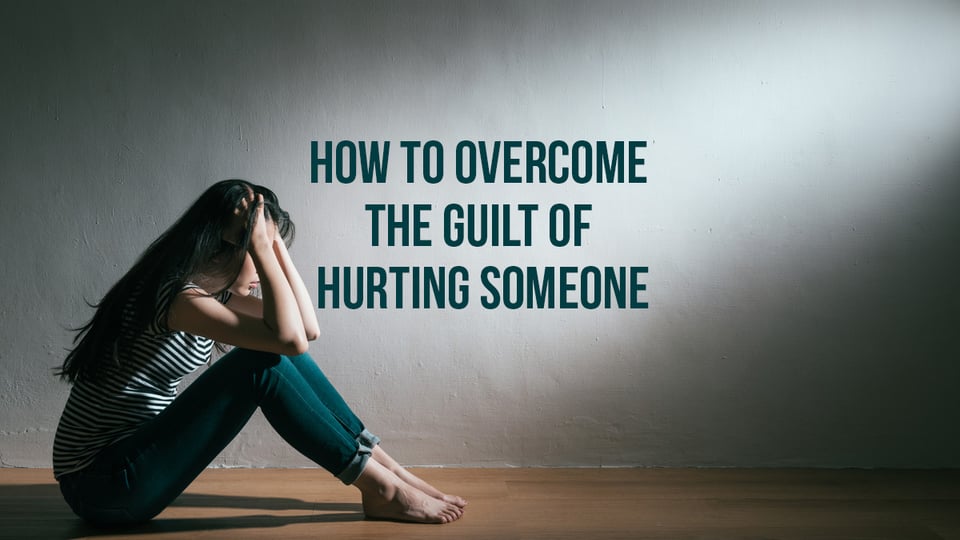How to Overcome the Guilt of Hurting Someone
When we know we’re at fault for another person’s suffering, we can become stuck in a prison of guilt that we build for ourselves. How can we overcome this?

We’ve most likely all been in this situation.
There’s no true gray area, no justifications or rationalizations to get us away from the fact that we’ve hurt someone, and it is our fault. We have also been in situations where the blame might go 50-50, but another person still has been affected. It does not make anything better if one is hurt less than the other.
Even after saying “I’m sorry” or “I never intended for you to get hurt,” we can still struggle with lingering guilt and shame that goes far beyond the time of the offense. Initial guilt and shame for hurting someone is a normal and appropriate reaction, but long-term shame, cycling through anxiety and depression, can have a devastating effect.
How do we overcome this guilt?
How to pursue reconciliation
Here are four steps toward reconciliation with both the offended person and God.
1. Repent to God for the sins you committed in hurting the other person.
When we hurt another person, we should first ask for God’s forgiveness. This is the most important thing, and it is covered in detail in our articles “How to Pray for Forgiveness,” “Godly Sorrow,” “Go and Sin No More” and related articles.
2. Make sure you have offered the other person a genuine, complete apology for the offense.
Sometimes a lackluster “I’m sorry” doesn’t provide much closure to those who have been hurt.
The apostle Paul wrote about two different types of regret: the type where we are only sorry we got caught and the godly kind where we are brutally honest and change for the better (2 Corinthians 7:9-12).
Apologize! When we apologize, we must honestly acknowledge our wrong and ask forgiveness from the offended. 
- Did we honestly confess or acknowledge our wrong, or did we claim to have no sin (1 John 1:8-10)?
- Did we admit the damage our offense caused, showing that we are fully aware we are to blame for the harm (Psalm 51:3-4, 14)?
- Did we commit to restitution or making amends (Exodus 22:1-4; Leviticus 6:4-5)?
- Did we ask forgiveness from the offended (Matthew 6:12-15)?
It might sound like this: “I’m so sorry for getting you fired. I was greedy and selfish by asking you to cover for me so much. I used our friendship to get what I wanted, and that got you fired. I can’t imagine how angry and depressed you must be, and I will do whatever I can to help you out of this mess I caused. I understand you might need time and distance from me for a while, but please forgive me and at some point allow me to help right this wrong I’ve done to you.”
We should be purposeful and sincere in communicating our apology, acknowledging the wrong and the emotional or physical damage it caused. Afterward, we should request forgiveness and openly express our desire to improve the situation.
This is more effective than a non-apology (“I’m sorry you feel hurt”), a caveated apology (“Sorry this happened, but you were no angel yourself”), or leaving it as a perpetual elephant in the room by pretending nothing happened.
For more insight on properly apologizing, read “Learning to Say ‘Sorry.’”
3. Remember, you are not the only person who has ever hurt someone else.
At first, this might sound like self-justification—letting ourselves off the hook because “everybody does it.” We should not hide behind the fact that every human has caused hurt, but it should be a reminder of the reality we live in and that we will never be perfect in this life. Every human being falls short of God’s glory by sinning against God and others (Romans 3:23; 1 Kings 8:46).
Once we have genuinely repented of an action, God forgives us. It is not a lingering offense that must weigh on us for the rest of our lives.
Once we have genuinely repented of an action, God forgives us. It is not a lingering offense that must weigh on us for the rest of our lives. Repentance shows humility and a willingness to turn around and go a different way. We should not tear ourselves to shreds over something God has forgiven us of.
It’s not about forgiving ourselves (a self-help platitude that attempts to give us the power to remove sin). It’s about believing that God is the “God-Who-Forgives” (Psalm 99:8).
If we fully repent, our sin becomes a lesson for the future, not a constant judgment against us.
For more insight, read our article “How to Deal With Guilt and Shame.”
4. Act and live in a way that demonstrates you have repented and changed.
When John the Baptist was preaching repentance, he urged his audience to “bear fruits worthy of repentance” (Luke 3:8-14). He taught people how to change their behavior moving forward. This principle directly applies to our response when we hurt someone else. We must make tangible changes in our behavior and approach toward that person.
John told those who had hoarded wealth to give to those in need. He told tax collectors to stop cheating people. He told soldiers to stop abusing their authority. These are verifiable actions that demonstrate a change has taken place—true repentance.
We must ask ourselves, What have we done to demonstrate to the hurt party that we are changing and doing things better? Is it evident that we will never treat anybody else that way again?
Guilt and shame have a temporary place in our lives
We should feel guilt and shame when we offend or hurt someone. A well-developed conscience that correctly discerns right and wrong should make us feel guilt and shame for hurting someone cruelly or unjustly.
But if shame sticks around long after repentance, in effect becoming a prison, we must take further steps. Was our apology sincere and accepted, or have we just assumed everything has smoothed over? Does our behavior demonstrate we are striving to avoid hurting others in the same way in the future?
However, even after all this, we may run into a situation in which the offended party is unwilling to forgive us despite all of our sincere efforts to reconcile. What do we do in that situation? You can read more about that in our articles “Grudges” and “What Does It Mean to Turn the Other Cheek?”
Overcoming hurting others can be summed up in one strategy: practicing genuine godly repentance.
For related information, see our blog series “The 5 Rs of Healing Relationships” and our articles “How to Apologize” and “Six Essential Elements of an Effective Apology.”
Date Posted: May 1, 2024



